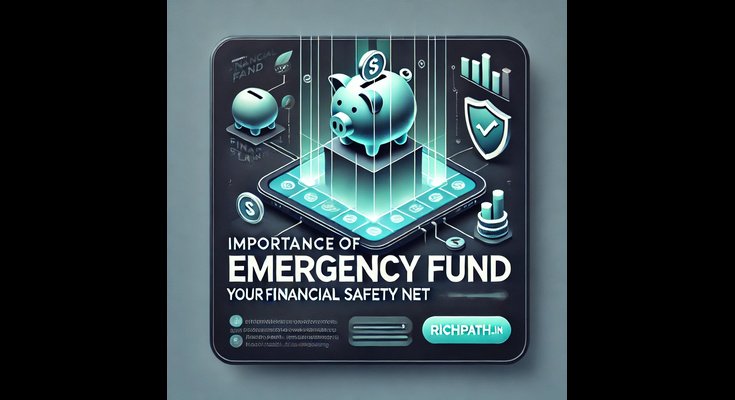
The Importance of Emergency Fund: Your Financial Safety Net
Life is full of uncertainties, and financial emergencies can occur when least expected. From medical emergencies to sudden job loss or urgent home repairs, these challenges can severely impact your financial stability. This is why understanding the importance of emergency fund is crucial. It acts as your financial safety net, providing peace of mind and security during difficult times.
In this guide, we’ll highlight the importance of emergency fund, how to create one, and why it’s an essential component of smart financial planning. By the end, you’ll realize how an emergency fund safeguards your financial future and keeps your long-term goals on track.
What Is an Emergency Fund?
An emergency fund is a designated reserve of money saved exclusively for unforeseen expenses or financial crises. Unlike regular savings, an emergency fund is purpose-built to handle situations that could otherwise derail your financial plans, such as unexpected medical bills or urgent home repairs.
Key Characteristics of an Emergency Fund
- Liquidity: Your emergency fund should be easily accessible, stored in a savings account or liquid mutual fund.
- Safety: Avoid risky investments; prioritize secure, stable options to preserve your funds.
- Adequate Size: The fund should ideally cover 3–6 months of essential living expenses.
The importance of emergency fund lies in its ability to provide financial security, helping you avoid high-interest debt and maintain your long-term financial stability.
Why Is an Emergency Fund Important?
The importance of emergency fund goes beyond having extra cash on hand. It provides financial protection against life’s unexpected challenges, allowing you to navigate tough times with confidence.
1. Financial Stability in Uncertain Times
An emergency fund ensures you can meet your expenses during difficult periods, such as job loss or medical emergencies.
Example:
Imagine losing your job unexpectedly. With an emergency fund covering three months of expenses, you’ll have the time to find a new opportunity without undue financial stress.
2. Avoiding High-Interest Debt
Without an emergency fund, many turn to credit cards or personal loans during crises, leading to high-interest payments that compound the financial burden.
Indian Context:
For instance, relying on a credit card with a 36% annual interest rate can quickly worsen your financial situation. The importance of emergency fund lies in eliminating this dependency.
3. Protecting Your Long-Term Goals
An emergency fund ensures you don’t have to tap into savings meant for retirement, education, or other long-term financial goals, keeping you on track for future success.
How to Build an Emergency Fund
Building an emergency fund may seem daunting, but with consistent effort and discipline, you can achieve it. Here’s how:
1. Assess Your Needs
Calculate your essential monthly expenses—rent, groceries, utilities, insurance—and multiply that amount by 3–6 to determine your target fund size.
2. Start Small and Stay Consistent
The importance of emergency fund doesn’t lie in how quickly you build it but in your commitment. Start with small, regular contributions and let them grow over time.
3. Choose the Right Account
Keep your fund in a safe, liquid option like a high-yield savings account or a liquid mutual fund to ensure it’s readily accessible when needed.
4. Automate Savings
Set up automatic transfers to your emergency fund to maintain consistency and eliminate the temptation to skip contributions.
Common Mistakes to Avoid
To fully appreciate the importance of emergency fund, avoid these common pitfalls:
- Using It for Non-Emergencies
Your emergency fund is not for vacations, shopping, or other non-essential expenses. Use it strictly for genuine financial crises. - Failing to Replenish It
After using your emergency fund, prioritize replenishing it immediately to restore your financial safety net. - Underestimating the Required Amount
A partial fund won’t provide the necessary protection. Aim to cover at least 3–6 months of expenses to ensure comprehensive security.
The Role of an Emergency Fund in Financial Planning
The importance of emergency fund in financial planning cannot be overstated. It forms the foundation of financial security, enabling you to avoid debt, protect your investments, and handle unforeseen challenges with confidence.
Whether you’re saving for retirement, a dream home, or your child’s education, an emergency fund ensures these goals remain intact, even when life throws a curveball.
Final Thoughts
The importance of emergency fund lies in its ability to act as a financial buffer against life’s uncertainties. It’s not just about saving money—it’s about building a safety net that protects your financial well-being and long-term goals.
Start small, stay consistent, and make building your emergency fund a priority. The sooner you begin, the more secure your financial future will be.
For more tips on personal finance, investing, and wealth-building strategies, visit Richpath.in. If you found this article helpful, share it with friends and family. Have questions or suggestions for topics? Drop a comment—we’d love to hear from you!
Read More-



